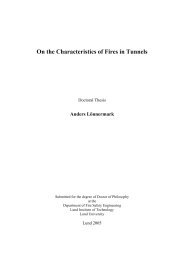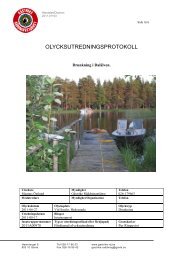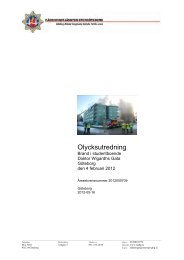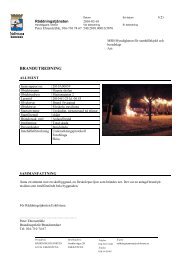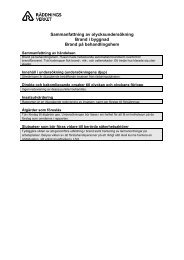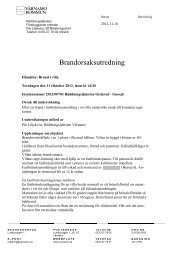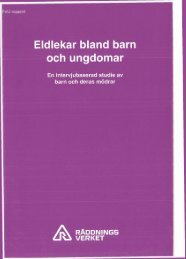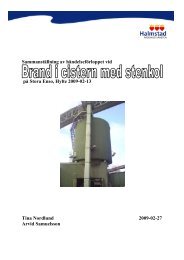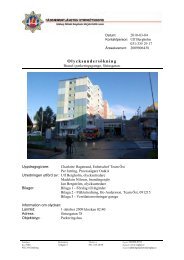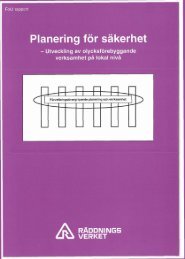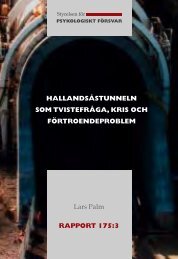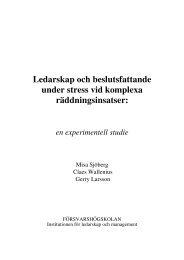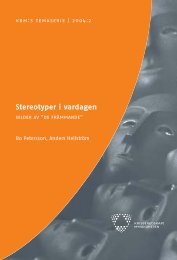Sverige
Sverige
Sverige
You also want an ePaper? Increase the reach of your titles
YUMPU automatically turns print PDFs into web optimized ePapers that Google loves.
16 kris och lärdom<br />
local elements and content rather than separating the<br />
political, operational and communication functions.<br />
And foremost a general understanding of the significance<br />
of communication, i.e. the importance of investing<br />
in broad-based communication initiatives during<br />
disasters, in the acute phase specifically but also throughout<br />
the entire disaster response process. Communication<br />
is half the job, claim several experienced<br />
staff and rescue operation managers.<br />
The likelihood of assimilating historical knowledge<br />
is reasonably good the closer in time to the previous<br />
event and the more personal experience one has, in line<br />
with the thesis of Brändström, Bynander & ’t Hart<br />
(2004). The same applies if the organizational conditions<br />
are similar. This study concludes however those<br />
individuals who have taken part in previous response<br />
operations have consistently detailed and clear memories<br />
and experiential perceptions regardless of the<br />
time lapse. These events and response operations are<br />
pregnant memory elements. Dissimilar organizational<br />
solutions do not necessarily impair the conditions for<br />
assimilating historical knowledge if we are to interpret<br />
their reports of previous and relevant response operations<br />
correctly.<br />
We can note a slightly pleasant but hardly surprising<br />
conclusion that disasters are good (to have experienced).<br />
A general reflection of the interviewed disaster<br />
professionals in this study is that during the actual<br />
disasters – the tsunami and the storm – they benefited<br />
from their experience of previous disaster response<br />
work. Their experiences gave them an inner security<br />
and knowledge that they had handled an extreme<br />
event before, which created a (feeling of) capacity to<br />
deal with this kind of work again. Previous knowledge<br />
has been cognitively processed and recreated. Knowledge<br />
transfer thus appears to be a central concept in<br />
disaster response.<br />
For the disaster professionals who have taken part<br />
in both “old” and new extreme events, we can speak<br />
about first and second degrees of experience and lessons<br />
learned. Compared with theories of single and<br />
double loop learning in organization research, learning<br />
from previous disasters deals to a large extent<br />
with the first type, but in some cases where systems<br />
and structures have been changed/extended we could<br />
possibly also speak about double-loop learning.<br />
A number of interviewed disaster professionals<br />
have held their positions for a long time and during<br />
that time experienced one or more extreme events.<br />
Their personal experience can be considered advantageous<br />
for local disaster work in the event of a new<br />
incident. But at the same time, this can be problematic<br />
when people retire or leave and are replaced by new<br />
employees. This is accentuated by the fact that local<br />
authorities do not always collate evaluations of their<br />
disaster response activities as a basis for managing<br />
new and serious social disruptions. Disaster management<br />
training can compensate, but recruitment in the<br />
disaster management area may could an embarrassing<br />
chapter for local authorities.<br />
This study can hardly assess whether there are<br />
any differences in disaster response capabilities between<br />
municipalities with a disaster experience and<br />
municipalities without (the latter are too few). One<br />
indication in this direction, however, is that defective<br />
communication work was observed in the municipality<br />
that did not have an (established) disaster and<br />
communication plan and that showed varying perceptions<br />
of how a plan of this nature should take form.<br />
In one of the municipalities that had not experienced<br />
previous disasters, the response to the January storm<br />
was implemented in a manner that could warrant a<br />
discussion.<br />
Some international research claims that analyses<br />
and experience of disaster response work rarely lead<br />
to changes in organisational and response forms, especially<br />
when these experiences have been problematic<br />
and negative. Lessons are not learned from the expe-



